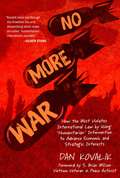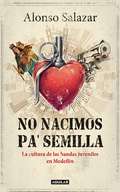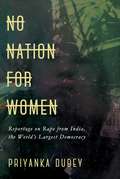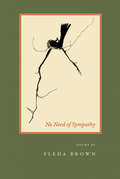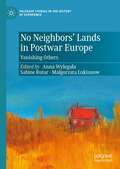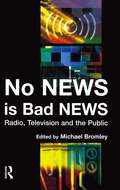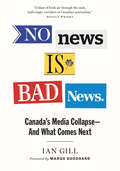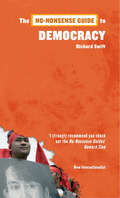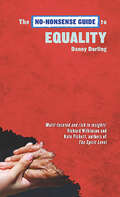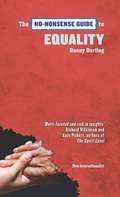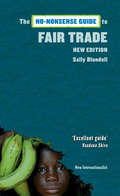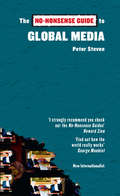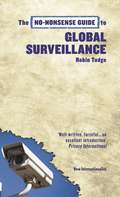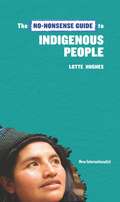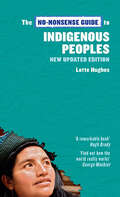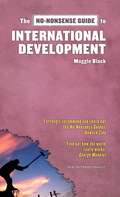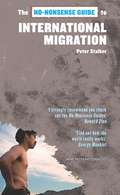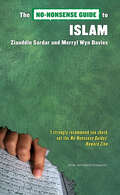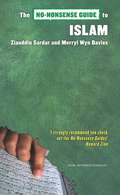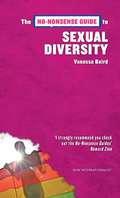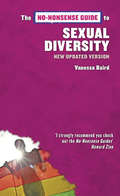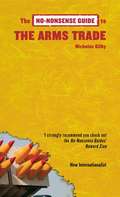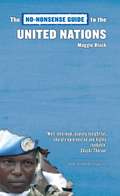- Table View
- List View
No More War: How the West Violates International Law by Using 'Humanitarian' Intervention to Advance Economic and Strategic Interests
by Dan Kovalik"Kovalik helps cut through the Orwellian lies and dissembling which make so-called 'humanitarian' intervention possible." —Oliver Stone War is the fount of all the worst human rights violations―including genocide―and not its cure. This undeniable truth, which the framers of the UN Charter understood so well, is lost in today&’s obsession with the oxymoron known as &“humanitarian" intervention.No More War: How the West Violates International Law by Using 'Humanitarian' Intervention to Advance Economic and Strategic Interests sets out to reclaim the original intent of the Charter founders to end the scourge of war on the heels of the devastation wrought by WWII. The book begins with a short history of the West&’s development as built upon the mass plunder of the Global South, genocide and slavery, and challenges the prevailing notion that the West is uniquely poised to enforce human rights through force. This book also goes through recent &“humanitarian" interventions carried out by the Western powers against poorer nations (e.g., in the DRC, Congo, and Iraq) and shows how these have only created greater human rights problems – including genocide – than they purported to stop or prevent.No More War reminds the reader of the key lessons of Nuremberg – that war is the primary scourge of the world, the root of all the evils which international law seeks to prevent and eradicate, and which must be prevented. The reader is then taken through the UN Charter and other human rights instruments and their emphasis on the prevention of aggressive war.
No nacimos pa' semilla
by Alonso SalazarUno de los libros más vendidos de Alonso Salazar. Lectura obligada para entender el surgimiento de la violencia urbana en Colombia. Este libro revela el mundo de los jóvenes que asociados en bandas han estremecido a Colombia con sus acciones temerarias. También, se descubren las raíces históricas y culturales de una generación que, entrelazada con el fenómeno del narcotráfico, gestó una subcultura con formas peculiares de religiosidad, lenguajes profanos y una actitud desafiante ante la muerte. Alonso Salazar (quien se convirtiera unos años después en el alcalde de Medellín) describe a través de varios personajes la dura vida de los jóvenes sicarios y de los habitantes de los barrios más marginados de la ciudad. Usa un lenguaje propio de estos grupos, el cual hoy, casi treinta años después, ha permeado la sociedad en general, lo que tal vez es una señal de cuánto la violencia nos ha marcado.
No Nation for Women: Ground Reportage on Rape from the World's Largest Democracy
by Priyanka DubeyNo Nation for Women takes a hard, close look at what makes India unsafe for its women — from custodial rapes and honour killings to rapes of minors and trafficking — the author uncovers many unpalatable truths behind what we are familiar with as newspaper headlines only... Numbers convey, in part, why India is referred to as one of the world’s rape capitals — one woman is raped every 15 minutes; and, in 50 years, there has been a staggering rise of 873 per cent in sexual crimes against girls. And beyond the numbers and statistics, there are stories, often unreported — of women in Damoh, Madhya Pradesh, who are routinely raped if they spurn the advances of men; of girls from de-notified tribes in central India who have no recourse to justice if sexually violated; of victimized lower-caste girls in small-town Baduan, Uttar Pradesh; of frequent dislocation faced by survivor families in West Bengal; of political wrath turning into rape in Tripura. Priyanka Dubey travels through large swathes of India, over a period of six years, to uncover the accounts of disenfranchised women who are caught in the grip of patriarchy and violence. She asks if, after the globally reported December 2012 gang-rape of ‘Nirbhaya’ in New Delhi, India’s gender narrative has shifted — and, if it hasn’t, what needs to be done to make this a nation worthy of its women.
No Need of Sympathy (American Poets Continuum)
by Fleda BrownNo Need of Sympathy is an exceptionally wide-ranging poetry collection, touching on contemporary science, physics, family, politics, and the natures of poetry and reality. These poems, the eighth collection by Fleda Brown, ask huge questions; they zero in like a microscope on what’s here, at hand. They are spoken with humility, great humor, curiosity, and a deep love of living.
No Need of Sympathy
by Fleda BrownNo Need of Sympathy is an exceptionally wide-ranging poetry collection, touching on contemporary science, physics, family, politics, and the natures of poetry and reality. These poems, the eighth collection by Fleda Brown, ask huge questions; they zero in like a microscope on what's here, at hand. They are spoken with humility, great humor, curiosity, and a deep love of living.
No Neighbors’ Lands in Postwar Europe: Vanishing Others (Palgrave Studies in the History of Experience)
by Anna Wylegała Sabine Rutar Małgorzata ŁukianowThis book focuses on the social voids that were the result of occupation, genocide, mass killings, and population movements in Europe during and after the Second World War. Historians, sociologists, and anthropologists adopt comparative perspectives on those who now lived in ‘cleansed’ borderlands. Its contributors explore local subjectivities of social change through the concept of ‘No Neighbors’ Lands’: How does it feel to wear the dress of your murdered neighbor? How does one get used to friends, colleagues, and neighbors no longer being part of everyday life? How is moral, social, and legal order reinstated after one part of the community participated in the ethnic cleansing of another? How is order restored psychologically in the wake of neighbors watching others being slaughtered by external enemies? This book sheds light on how destroyed European communities, once multi-ethnic and multi-religious, experienced postwar reconstruction, attempted to come to terms with what had happened, and negotiated remembrance.
No News is Bad News: Radio, Television and the Public
by Michael BromleyThis volume of collected essays provides a wide-ranging survey of the state of radio and television, especially the idea of public service broadcasting, and of news, current affairs and documentary programming in America, Australia, the UK and the rest of western Europe. Among the key issues it addresses are the 'dumbing down' of TV news, the infotainment factor in current affairs shows and the disappearance of the documentary. Using contemporary cases and examples - from the row over the scheduling of News at Ten in the UK to the creation of ABC News Online in Australia -- the essays link the performance of radio and television at the turn of the millennium with the processes of deregulation, liberalisation and digitalisation which have been evident since the 1980s. Working from a much needed and original comparative approach which encompasses complex and well-established public broadcasting in the USA as well as emerging and vulnerable participatory radio stations in El Salvador, the book sets a variety of experiences of factual radio and television programming within wider political and cultural contexts. It offers analyses of not only the 'problems' associated with news, current affairs and documentary broadcasting in an era of a declining public service ethos and the apparent triumph of the market, however. The essays also explore the potential of alternative radio and television, new forms of communication, such as the internet, and changing practices among journalists and programme makers, as well as the resilience of public broadcasting and the powers of the public to ensure that the media remain relevant and accountable. A companion text to the bestselling Sex, Lies and Democracy: The Press and the Public, this volume presents a multi-faceted approach to the tumultuous present and the uncertain future of news, current affairs and documentary in radio and television.
No News Is Bad News: Canada's Media Collapse - and What Comes Next
by Ian GillCanada's media companies are melting faster than the polar ice caps, and in No News Is Bad News, Ian Gill chronicles their decline in a biting, in-depth analysis. He travels to an international journalism festival in Italy, visits the Guardian in London, and speaks to editors, reporters, entrepreneurs, investors, non-profit leaders, and news consumers from around the world to find out what's gone wrong. Along the way he discovers that corporate concentration and clumsy adaptations to the digital age have left Canadians with a gaping hole in our public square. And yet, from the smoking ruins of Canada's news industry, Gill sees glimmers of hope, and brings them to life with sharp prose and trenchant insights.
The No-Nonsense Guide to Democracy
by Richard SwiftFollowing the economic meltdown and the triumph of Barack Obama, have the chances of genuine democracy improved?In this updated edition of The No-Nonsense Guide to Democracy, Richard Swift explores how democracy has been constricted and deformed by economic power brokers and a self-serving political class from Birmingham to Bangalore. He considers the different tools people in power have used to manipulate democratic principles, such as freedom, to their advantage.The book includes chapter-length discussions of topics such as the economic meltdown, Barack Obama, eco-democracy, democratizing the economy, and democracy in the global south. It is also a guide to the rich diversity of forms of elected government, and it contains practical ideas for empowering today's voters around the world.Richard Swift was co-editor for the New Internationalist magazine from 1984 to 2007 and lives in Toronto. He has written and broadcast on questions of ecology and democracy for many years.
No-Nonsense Guide to Equality (No-Nonsense Guides #6)
by Danny DorlingA wide-ranging exploration of why inequality persists and what can be done about it, the No-Nonsense Guide to Equality discusses the positive effects that equality can have, using examples and case studies from across the globe. It examines the lessons of history and covers race, gender and ethnicity, age, and wealth. Danny Dorling considers, realistically, just how equal it is possible to be, the challenges we face, and the factors that will lead to greater equality for all.
No-Nonsense Guide to Equality (No-Nonsense Guides #6)
by Danny DorlingA wide-ranging exploration of why inequality persists and what can be done about it, the No-Nonsense Guide to Equality discusses the positive effects that equality can have, using examples and case studies from across the globe. It examines the lessons of history and covers race, gender and ethnicity, age, and wealth. Danny Dorling considers, realistically, just how equal it is possible to be, the challenges we face, and the factors that will lead to greater equality for all.
The No-Nonsense Guide to Equality
by Danny Dorling Richard Wilkinson Kate PickettThe No-Nonsense Guide to Equality discusses the positive effects that equality can have, using examples and case studies from across the globe, including many from the United States. It examines the lessons of history and covers race, gender and ethnicity, age, and wealth. Danny Dorling considers, realistically, just how equal it is possible to be, the challenges we face, and the factors that will lead to greater equality for all.Danny Dorling is professor of human geography at the University of Sheffield, United Kingdom, and one of the leading international experts on inequality. He has written extensively about the widening gap between rich and poor and his work regularly appears in the Guardian. He is author of several books, including Injustice: Why Social Inequality Persists and The Atlas of the Real World.
The No-Nonsense Guide to Fair Trade
by Sally BlundellAn in-depth look at two decades of a movement that aims to challenge the ethical foundations of the global market.Transnational corporations look for the cheapest suppliers, while the fair trade movement insists on a premium for the producers at the start of the chain.Sally Blundell uncovers the origins of fair trade and what it is likely to become.
The No-Nonsense Guide to Global Media
by Peter StevenPeter Steven explores the diversity of world media, from the corporate to the independent. He introduces readers to the political economy of the major media outlets, looking at the concentration of ownership and the convergence of technologies and media functions. In doing so, he encourages us to question how the media reflects society: are we passive recipients, or do we have a part in constructing the world?Peter Steven is a freelance writer based in Toronto, Canada. He has been a film columnist for New Internationalist and The Beaver magazines, and associate editor of Jump Cut magazine.
The No-Nonsense Guide to Global Surveillance
by Robin TudgeSpying, once the province of the KGB, CIA and MI5, has become part of everyday life. Governments routinely trawl our emails, CCTV cameras follow us on every street, while state databases of our DNA become larger all the time. This book shows the extent to which Big Brother is watching us all.
The No-Nonsense Guide to Indigenous People
by Lotte HughesThis guide looks beyond the exotic images tracing the story of different indigenous people from their first contact with explorers and colonizers to the present day. Much of this story is told by the indigenous people themselves and they present the issues behind the challenge to give them their own space in their own lands.
No-Nonsense Guide to Indigenous Peoples, Second Edition (No-Nonsense Guides #16)
by Lotte HughesSince the first edition of the No-Nonsense Guide to Indigenous Peoples was published in 2003, much has changed. The United Nations General Assembly has adopted the UN Declaration on the Rights of Indigenous Peoples. Indigenous rights have become an increasingly important subject in international law, with Bolivia’s first indigenous president, Evo Morales, arguing on the international stage from an indigenous perspective, and introducing policies benefiting indigenous communities through land reforms and redistribution of wealth. Moreover, there has been a surge in indigenous activism and advocacy, with the growth of a global indigenous rights industry, the effects of which are not always positive. This updated edition reflects the changing context and examines the developments as well as the tensions and contradictions, and includes as many direct voices as possible.
The No-Nonsense Guide to International Development
by Maggie Black"Overseas aid" and "international development" are catch-all terms that cover a multitude of activities--and abuses. This guide explains what "development" actually is--and explores its political and economic roots. It shows what can happen in the name of development and argues for a more organic, social approach with those it seeks to serve as equal partners in the process. Maggie Black has written books for the Oxford University Press, UNICEF, and Oxfam. She has worked as a consultant for UNICEF, Anti-Slavery International, and WaterAid, among others, and has written for the Guardian, The Economist, and BBC World Service.
The No-Nonsense Guide to International Migration
by Peter StalkerVirtually any commodity can move around the world to satisfy demand, but human beings have far less freedom. Many would-be migrants are forced to risk life and limb traveling illegally. Yet most rich countries are short of workers, have shrinking populations, and need more immigrants. This is a timely guide to a major issue that is never far from the political headlines.Peter Stalker is a former co-editor of the New Internationalist who now works as a consultant to a number of UN agencies. He has written two books on migration for the International Labor Organization.
No-Nonsense Guide to Islam (No-Nonsense Guides #19)
by Merryl Wyn Davies Zia SardarEven before September 11, 2001, Muslims were often framed by Western media and many non-Muslims as enemies of “freedom” and “progress.” Like other religions, Islam is not without its ongoing tensions and struggles. However, like other religions, there is a depth and richness to the Islamic faith that is too often overlooked because of stereotypes. This No-Nonsense Guide looks at the complexities of Islam and how its adherents are reconciling their faith with the social realities of the twenty-first century. In so doing, Merryl Wyn Davies and Zia Sardar examine the Qur’an and Islamic law (sharia), how world history has been shaped by Islam, Islam’s rocky relationship with the Western world, and the many challenges within and without Islam.
The No-Nonsense Guide to Islam
by Ziauddin Sardar Merryl Wyn DaviesThis guide explains Islamic history, the Qur'an, sharia law, and Islam's relationship with the West. It analyzes the struggle within the faith for a more humane interpretation of the religion, issues surrounding women, democracy, and economic development, and the outlook post-9/11 and the Iraq war. Merryl Wyn Davies is a writer, anthropologist, and TV producer. The author of Knowing One Another: Shaping an Islamic Anthropology, she also co-authored the international bestseller Why Do People Hate America? Ziauddin Sardar is a writer, broadcaster, and cultural critic. His works include Postmodernism and the Other, Orientalism, and Why Do People Hate America?, written with Merryl Wyn Davies.
The No-Nonsense Guide to Sexual Diversity
by Vanessa BairdThe treatment of sexual minorities--whether lesbian, gay, bisexual, or transgender--varies significantly in different parts of the world. In some countries, equal rights have been achieved and progress is being made against discrimination; in others, being gay still incurs the death penalty.This guide examines all the colors of the sexual rainbow, unearths hidden histories, and looks at contributions from medicine and science. It also includes a unique global survey of laws that affect sexual minorities. Vanessa Baird has been co-editor at New Internationalist magazine since 1986. Her previous books include, as compiler and editor, Eye to Eye Women.
No-Nonsense Guide to Sexual Diversity, 2nd edition (No-Nonsense Guides #22)
by Vanessa BairdThe world is changing and especially so for lesbians, gays, and people who are bisexual and transgendered. In some countries, hard-won battles for equality are bearing fruit in non-discrimination legislation. In others, being gay incurs the death penalty. This No-Nonsense Guide gives an overview of sexual diversity and reveals the hidden histories of LGBTI individuals, cross-dressers, and eunuchs across the world. It traces the strange search for the scientific “source” of homosexuality, the history of homophobia, and the role that religion and politics have played in controlling sexualities. Also included is a country-by-country global survey of the laws that affect sexual minorities.
No-Nonsense Guide to the Arms Trade
by Nicholas GilbyOne of the few up-to-date works on the whole of the arms trade, this book puts the global trade in weapons in the context of history and includes recent controversial deals, as well as case studies on Saudi Arabia, Iraq, and Darfur. It exposes the cynicism, bribery, and insider deals that characterize the conventional trade and the hidden world of torture.Nicholas Gilby led the Campaign Against Arms Trade (CAAT) in its efforts to expose the corruption at the heart of Britain's arms deals with Saudi Arabia over the past four decades. In 2008, he forced the disclosure of many documents concerning corruption in Britain's arms deals with Saudi Arabia.
The No-Nonsense Guide to the United Nations
by Maggie BlackIn the first book to distill the entire history of the United Nations into one accessible volume, Maggie Black explains how this complex organization works and explores its successes, failings, and current limitations. The book includes the creation of the UN and its early history, how it is structured, and whether it is well constituted in its functions. Black also considers possibilities for reform to make it more democratic, effective, and fit for its purpose.Maggie Black has written books for Oxford University Press, UNICEF, and Oxfam and articles for The Economist and BBC World Service. She has worked as a consultant for UNICEF and Anti-Slavery International.
